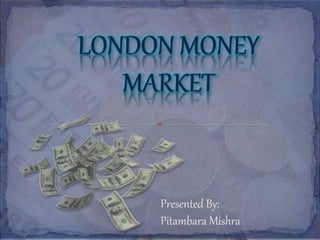London money market
- 2. ï Highly Organized ï Well developed ï It satisfies all conditions of good money market. ï Well developed banking systems ï The bank of England is the central bank of the country which performs all the functions effectively and efficiently. ï It has many submarkets and each submarket consisting of number of dealers with large funds. ï Highly integrated structure.
- 3. ï Bank Of England ï Joint Stock Banks ï Acceptance Houses ï Discount Houses ï Bill Brokers
- 4. ï The BOE is the leader and occupies the top position of the London Money Market. ï It is the lender of the last resort and the ultimate serviour of cash. ï It also borrows large sum of money in the money market by its weekly issues of T-bills by tenders. ï The BOE act as a banker of the govt. ï It controls credit created by commercial banks. ï Its credit policy is more effective as London Money Market is a developed one.
- 5. ï Most important constituent after BOE. ï Most of the banking business in England is concentrated in few banks, popularly known as âBIG FIVEâ. ï Midland ï Barclays ï Llyods ï Westministor ï National Provincial ï JSB receive deposits from the public and lend money to merchant and manufacturers for short term period. ï They also lend to brokers and discount houses amd these loans are repayable on demand or short notice. ï These are called âCALL LOANSâ
- 6. ï Such houses are not found anywhere else in the world. ï They accept Bills Of Exchange on the behalf of their customers. ï The bill, accepted by the international reputed acceptance houses can be readily discounted in LMM at low rate of interest. ï A small commission for this service is charged by the acceptance house.
- 7. ï Specialize in discounting Bills Of Exchange. ï Deal in T-Bills and Commercial Bills. ï They borrow from the commercial banks for short periods at low rate of interest and invest them in Bill Of Exchange. ï The purpose is to discount bills at a high rate and enjoy profit.
- 8. ï Act as intermediaries b/w those who want discount bills and those who want to invest in bills. ï They get brokerages for their services.
- 10. ï The European market where US dollars can be deposited and loaned for short periods of time. In this market, loans are made in the form of Eurodollars and products are denominated in the US currency. However, because transactions are typically $1 million or more, only large institutional investors participate in this market. Also, because this market is largely unregulated, banks can lend out 100 percent of the deposits they receive and therefore offer extremely attractive interest rates.
- 11. ï The loose network of negotiations and transactions occurring between banks, large financial institutions or other large companies. Interbank markets are unregulated by governmental entities, and are often associated with currency transactions. Trades can be conducted directly between each entity or through electronic brokering platforms. This market allows over 1000 banks to trade between one another.












